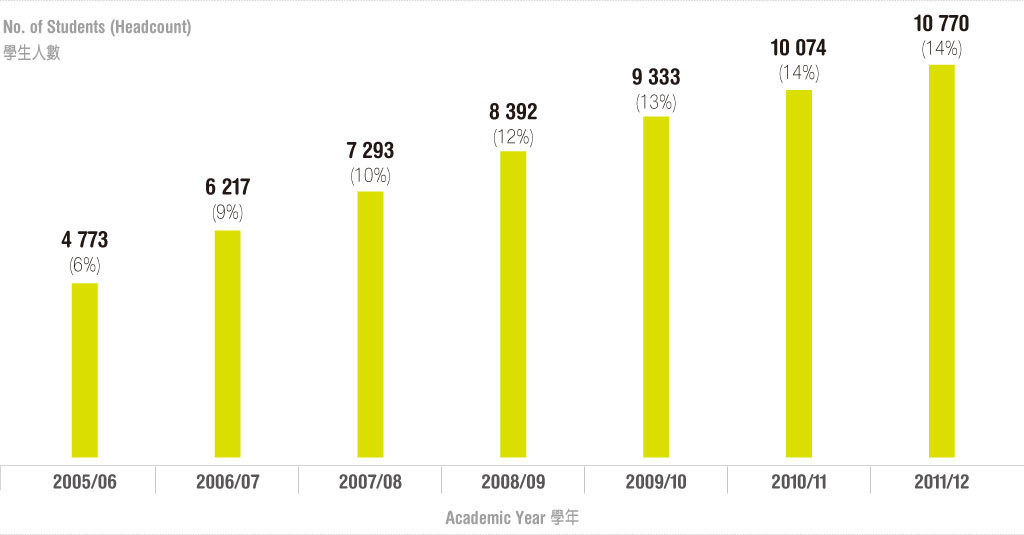|
The Higher Education Review (HER) Report issued in December 2010 stated that internationalisation should become one of the central themes of all UGC-funded institutions and should permeate the whole gamut of institutional activities. The report emphasised the need to have a clearly formulated and long-term commitment by the Government and institutions, which will be most effectively achieved in a framework in which both are aware of and have agreed upon common objectives.
The Government has endorsed the overall direction of the HER Report. Specifically, the Government agrees with UGC that internationalisation covers a wide spectrum of issues, including curriculum design, research collaboration, international faculty mix, student recruitment, integration of all students on campus, provision of hostel and private accommodation, etc.
The UGC sees internationalisation and engagement with Mainland China as the key to Hong Kong's future, and that it should be actively pursued by the UGC-funded institutions. Robust higher education has been recognised as an engine for growth in knowledge-intensive economies around the world, as the success of these economies depend on the skills, agility and creativity of the population, as well as the society's capacity for innovation. In the process of rapid globalisation, the UGC believes that higher education institutions have the function and the duty to enhance the quality of education for our students and our research capability, with a view to equipping students with the relevant knowledge, skills and attitudes that can contribute to the society and the world. In view of the intense competition both globally and regionally, there is an urgent need to take forward the initiative.
To pursue the initiatives to promote internationalisation and engagement with Mainland China as contemplated in the HER Report, the UGC has commenced a strategic dialogue with the Heads of Universities Committee (HUCOM) and the institutions to map the way forward and to set priorities, having regard to the need to respect institutional autonomy and the institutions' plans and policies that are already in place. Through the dialogue, it is hoped that the UGC can foster mutual understanding and trust with the institutions, and develop appropriate strategies for assisting the institutions in the pursuit of the initiatives.
In 2011, the UGC introduced a new round of the Matching Grant Scheme for Internationalisation by providing a further one-off $50 million on a matching basis for distribution to institutions according to undergraduate student numbers. Institutions can use the matching grants for up to three years' time to provide more overseas exchange opportunities for local students, so as to encourage them to "go out" and to broaden their horizons.
Chart 1: Non-local Students from Places Other Than the Mainland of China, 2009/10 and 2011/12
Chart 2: Distribution of Incoming Exchange Students by Place of Origin, 2010/11
Other than student exchange activities, it is also believed that students could grow and learn from international experiences in other ways too, such as service abroad, extended internships abroad and study trips etc.
In terms of non-local student recruitment, starting from 2008/09, the UGC-funded institutions are allowed to increase, in phases, the non-local student quota for publicly-funded programmes at the sub-degree, degree and taught postgraduate levels from 10% to 20% of the approved student number targets. The percentage of non-local students in institutions has been constantly on the rise: Chart 3: Non-local Student Enrolment (Headcount) of UGC-funded Programmes, 2005/06 to
2011/12

|
|
Note: Figures in brackets denote percentages of non-local students to total student enrolment.
|
In 2011/12, the eight institutions recruited a total of 2 004 first-year-first-degree (FYFD) non-local students from the Mainland and other places, accounting for about 14% of the planned intake. It is certainly a leap from the 1% and the 7% as recorded in 2000/01 and 2005/06 respectively.
Chart 4: Non-local Student Enrolment (Headcount) of UGC-funded Programmes by Institution
and Place of Origin, 2011/12
Chart 5: Distribution of Outgoing Exchange Students by Destination, 2010/11
The successful implementation of internationalisation requires more than the recruitment of non-local students. The UGC is glad that the Education Bureau has been working hand in hand with institutions to step up exchange and promotion of education services in Hong Kong. In 2011, two delegations were organised by the Education Bureau to visit Vietnam and Brunei Darussalam, and joined by a number of the UGC-funded institutions. These were important steps to enhancing the international visibility of our education services.
|



